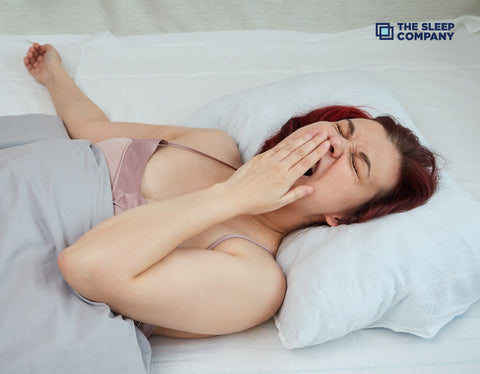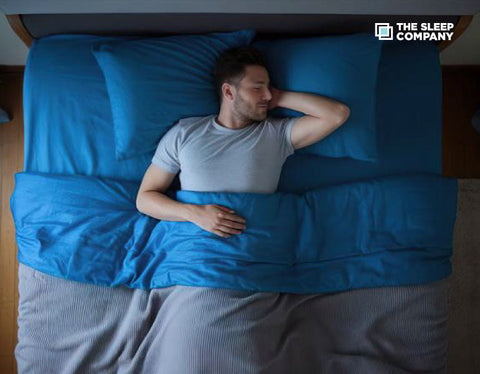My Cart

Benefits of Exercise and Healthy Eating For Sleep

A well-balanced meal, a good night's rest, and regular physical activity are imperative for your overall well-being.
So, if you are someone looking to improve your lifestyle and want to enjoy a proper slumber each night, nutrition and exercise also come into play.
Let's dig a bit more and tell you how all these activities are interconnected. Read ahead to learn more about all the benefits of exercise and healthy eating for sleep.
What's the Connection Between A Healthy Lifestyle and Sleep?
When we say a healthy lifestyle, it includes a regular balanced diet and exercise. Together, food and exercise can significantly improve sleep quality.
Let's first talk about food. When you consume nutritious foods, it provides the body with the necessary vitamins and minerals. Infact, a well-balanced meal is known to reduce the risks of several health conditions, such as stroke, diabetes, etc.
But there's more. Good food can maintain your energy levels, which is crucial for exercise and curbs stress to help you sleep easily. Being mindful of your choices is also imperative here. For instance, avoiding a heavy meal at night can be beneficial.
Coming to exercise, regular workouts also play a major role in reducing stress and anxiety. Of course, there are other long-term benefits too, such as weight management and reducing the risk of chronic conditions. However, exercise is associated with a good night's rest and can help individuals overcome sleep disorders as well.
5 Benefits of Regular Exercise for Better Sleep
First, let’s understand the top five benefits of exercise for sleep.

1. Sleep Quality Improves
If you are someone who takes their own sweet time to fall asleep, exercise can be a lifesaver. Normal sleep means you fall asleep within 10 to 20 minutes of hitting the sheets. If that's not the case and you take longer, it can mean that your sleep quality is not up to the mark. Here, exercise can help.
Regular physical activity can help you fall asleep faster and enjoy deeper sleep. How? Well, exercise helps you spend more time in the slow-wave sleep phase. This is the deepest and quietest phase of sleep, which is essential for physical and mental restoration.
2. Reduces Symptoms of Insomnia
While insomnia is a sleep disorder, poor sleep habits can lead to it.
One of the main benefits of exercise for sleep is that it can significantly reduce symptoms of insomnia, such as difficulty falling asleep or staying asleep.
It even helps regulate the body's internal clock, known as the circadian rhythm, which makes it easier to fall asleep. This is because when you exercise in the morning, you are exposed to natural sunlight. It is a powerful cue for regulating the circadian rhythm. Natural light helps signal to your brain that it’s time to wake up and be alert.
Also, exercise can help optimize the timing of melatonin production, which is a hormone that regulates sleep-wake cycles.
3. Curbs Any Stress and Anxiety
Today, keeping yourself away from stress and anxiety is a tedious chore in itself. From social media to certain work cultures, there are several elements at play here. Infact, a whopping 82% of Indians are stressed out today
But stress and anxiety are culprits that can make you unhappy. That's not all. They interfere with your sleep, which can further aggravate it.
So, when you embrace a fitness-healthy lifestyle, it reduces levels of stress hormones, such as cortisol, and increases the production of endorphins, the body's natural mood lifters. This reduction in stress and anxiety can lead to better sleep and improves your overall mental well-being.
4. Increased Sleep Duration
Let's say you are someone who sleeps on time. Great! But do you enjoy an uninterrupted sleep? Do you sleep for seven to eight hours without any disturbance? While falling asleep on time is important, enjoying the ideal sleep cycle as per your age is also crucial. Most adults need at least seven hours.
Exercise can help extend the duration of your sleep and make sure you get enough rest to feel rejuvenated. It is particularly beneficial for people who struggle with short sleep duration.
5. Enhanced Daytime Alertness
We have all woken up groggy and irritated at least once. But imagine, what if it became a regular occurrence?
Regular exercise can help you avoid the same. It improves overall energy levels and reduces daytime sleepiness. So, you are not only feeling fresh and productive all day long but also maintaining a consistent sleep-wake cycle.
5 Benefits of Healthy Eating for Better Sleep
Now you know the benefits of exercise for sleep. So, let’s understand healthier eating for a peaceful shut-eye.

1. Regulated Blood Sugar Levels
Right from our school days, we have all heard how a balanced diet is important. A balanced diet includes whole grains, lean proteins, fruits, and vegetables.
When you eat healthy, they help stabilize blood sugar levels throughout the day.
Stable blood sugar keeps your cardiovascular system healthy and reduces the risk of heart disease. They can also prevent spikes and crashes that may disrupt sleep, especially during the night.
2. Improved Digestion
Picture this. You are someone who hasn't been paying attention to what they eat. And, most of the time you feel bloated and heavy. This not only leads to issues like acidity but can also make it difficult to sleep.
Eating nutritious foods is the key here because it supports good digestion. It reduces discomfort like heartburn or indigestion that can interfere with sleep quality.
This is why it is always ideal to eat healthy. Remember, healthy food can be delicious too.
3. Supports Sleep Hormones
Certain nutrients found in healthy foods, such as magnesium, potassium, and tryptophan, play super crucial roles in producing essential sleep hormones. For instance, foods rich in magnesium include leafy green vegetables, and they can regulate neurotransmitters that promote sleep.
This is why what you eat helps you even with sleep. Even if you are looking for late-night snacks, choose wisely. For instance, a banana can be ideal as they are rich in potassium and can help you with sleep.
4. Helps You Maintain Ideal Body Weight
We all know how exercise and diet contribute to a healthy weight. But did you know? A healthy body weight can help with a good night's sleep.
Excess weight can put you at risk of sleep disorders, such as sleep apnea. This disrupts your sleep cycle and can make you feel fatigued.
5. Stress Reduction
Yes, food can help you with your stress too. When you consume those rich in antioxidants and omega-3 fatty acids like fruits, vegetables, and fish, they reduce inflammation and oxidative stress in the body.
This helps lower levels of stress and anxiety, which helps you achieve better sleep.
Takeaway
In this era, where we live a mechanical life with hectic schedules, time has become scarce. However, prioritizing diet and exercise ensures you enjoy a good night's rest, which, in turn, ensures your overall well-being.
But there's another thing that's a must when it comes to sleep, and we are talking about a comfortable mattress. Remember, apart from food nutrition, health, and fitness, the mattress is the hero when it comes to sleep.
Imagine this. You are on top of health, fitness, and nutrition. You go to bed on time and have a productive plan for the next day. But as you take your favorite sleeping position, you feel aches and pains in the pressure points. So, rather than sliding right into a sweet slumber, you end up tossing and turning.
However, a good mattress like The Sleep Company's Smart Ortho Pro Mattress has your back. Right from offering pressure point relief to breathability, this mattress comes with the advanced SmartGRID Technology that's designed to offer the right balance between comfort and support.
So, embrace a healthier you today with The Sleep Company by investing in the ultimate sleep experience.
FAQs
Exercise improves sleep quality by helping you fall asleep faster and enjoy deeper sleep. It reduces stress and anxiety, which are generally the most common culprits that hamper your sleep. Regular physical activity can also help regulate your sleep patterns. When this happens, it becomes easier to wake up refreshed each day.
You don't need anything too rigorous or intense to avail the benefits of exercise for sleep. Walking, jogging, and swimming can be great for improving sleep. Yoga and stretching can also help relax your body and mind before bed.
The best time to exercise for better sleep is usually in the morning or afternoon. Exercising too close to bedtime, especially intense workouts, can make it harder to fall asleep. So, while exercise is good for sleep, make sure you are mindful of the timings.
Healthy eating helps you sleep better because it provides the nutrients your body needs to relax and maintain a regular sleep cycle. Foods rich in vitamins, minerals, and antioxidants support brain function and reduce stress. Also, when you avoid caffeine and heavy meals before bedtime, it makes it easier to fall and stay asleep.





























































